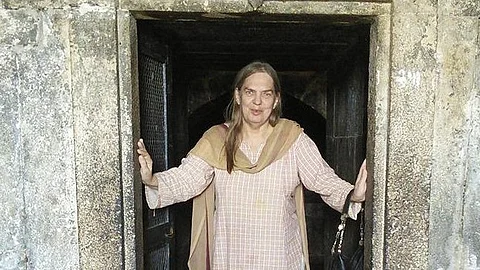A vision for Begumpura: Remembering anti-caste scholar & activist Gail Omvedt on her birth anniversary
Today, August 2, marks the birth anniversary of Indian sociologist, writer, activist, and prominent intellectual of the Bahujan movement, Gail Omvedt.
Born in Minneapolis in 1941, Omvedt chose India as her home, where she would spend the rest of her life as a prominent figure in various women’s rights and anti-caste movements. She initially came to India in the 1960s on a Fulbright Scholarship as an English tutor.
In the 1970s, she would return to India as a PhD scholar at the University of Berkeley to research for her dissertation on Jyotirao Phule and his Satyashodak Movement.
It was during her research on the caste system that she met her husband, Bharat Patankar, an activist and founder of the Maharashtra Shramik Mukti Dal.
Following the submission of her dissertation, “Cultural Revolt in a Colonial Society: The Non-Brahman Movement in Western India, 1873-1930,” Omvedt, moved by caste discrimination and untouchability in India, chose to leave her teaching job in the United States of America (USA) and settle in India, eventually becoming a citizen in 1983.
From that point, Omvedt would become a well-regarded intellectual in the anti-caste movement in India, engaging in several workers’ rights, women’s rights, anti-caste, and environmental movements. She would even address seminars, conferences, and public gatherings in fluent Marathi. She also fought for the rights of people displaced due to the construction of Koyna Dam in Maharashtra.
In addition, she also continued academic pursuits, shaping feminist, anti-caste, and Ambedkarite thought through the 80s and 90s. She occupied several important positions in academia, such as:
Dr Ambedkar Chair Professor at the Indira Gandhi National Open University (IGNOU),
Professor of Sociology at the University of Pune,
Senior Fellow at the Nehru Memorial Museum and Library,
Visiting Professor at the University of Pune's School of Social Justice,
Asian Guest Professor at the Nordic Institute of Asian Studies, Copenhagen, etc.
Omvedt was sharp in her criticism of the caste system and the Hindu social order, academically termed as “Brahminism”. She saw Brahminism as the key perpetrator of caste discrimination in India, exploring its historic roots and ongoing impact in Independent India.
She was among the first scholars in independent India to thoroughly analyse the politics and intellectual works of key anti-caste thinkers, including Sant Ravidas, Jyotirao Phule, and Dr BR Ambedkar.
Further, she drew connections between caste, class, and gender dynamics in India, recognising the ways these systems intersect to shape women’s experiences in India. She championed the rights of women from marginalised sections of India, especially from villages and Dalit and Adivasi communities. She actively participated in and contributed to various women's organisations and movements, including Stree Mukti Sanghatana and Shetkari Mahila Aghadi.
A prolific author, Omvedt authored over 25 books on anti-caste movements and women’s issues, including:
Seeking Begumpura: The Social Vision of Anticaste Intellectuals
Jotirao Phule and the Ideology of Social Revolution in India
We Will Smash This Prison!: Indian Women in Struggle
Ambedkar: Towards an Enlightened India
Reinventing Revolution: New Social Movements and the Socialist Tradition in India
Dalit Visions: The Anti-caste Movement and the Construction on an Indian Identity
Buddhism in India: Challenging Brahmanism and Caste
While these books extensively chronicle the life, times, and ideas of prominent anti-caste thinkers, mass movements by the Scheduled Caste (SC), Scheduled Tribe (ST), and Other Backward Classes (OBC) communities, and women’s liberation, they also contain Omvedt’s vision for India.
In Seeking Begumpura, for instance, she referred to Sant Ravidas’ utopian, classless, casteless and sorrowless city of the same name, translated literally to “a city without sorrow”. She thus juxtaposed the emancipatory ideas of thinkers like the Buddha, EV Ramaswamy “Periyar,” Dr BR Ambedkar, Jyotirao Phule & Iyothee Thass, as well as Bhakti saints like Chokamela and Kabir, with this city, painting a subaltern imagination of an egalitarian future.
These ideas further influenced social movements in India, particularly Kanshi Ram’s The All India Backward and Minority Communities Employees Federation (BAMCEF) and Bahujan Samaj Party (BSP).
In 2021, however, Omvedt passed away on August 26 at her home in Kasegaon village, Satara district, Maharashtra. She is survived by her husband, daughter, son-in-law, and granddaughter.



